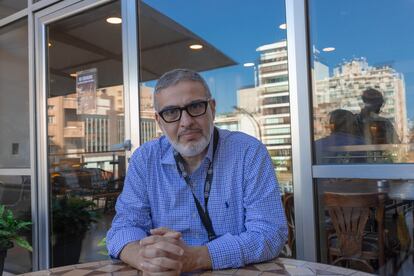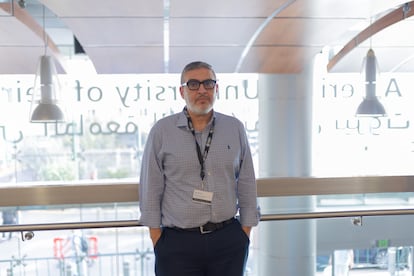Ghassan Abu-Sitta, volunteer doctor in Gaza and Lebanon: ‘Children live in houses. So, when you bomb houses, you kill children’
The Palestinian-British surgeon became a household name for his wartime work in the Strip and he is once again treating victims of Israeli attacks in Beirut: ‘Same ammunition, same perpetrators, same injuries, same age groups…’

October 9 will mark one year since the Palestinian-British surgeon Ghassan Abu-Sitta rushed from London to Gaza. Israel, in the wake of the Hamas-led attacks two days earlier, was already heavily bombing the Strip from the air, but had yet not launched its ground invasion, so Abu-Sitta — who is accustomed to service as a wartime volunteer, having been on the ground during 12 conflicts and with two published books on the subject — joined Doctors Without Borders.
In Gaza, he spent 43 days amputating and reconstructing victims of Israeli airstrikes and artillery in two hospitals that would become known around the world — Al Ahli and Al Shifa — and where Abu-Sitta also became, thanks in part to his command of English, a familiar face to the media. Eventually, he now says, his work was cut short as the medical equipment necessary to operate was lacking. “In Deir al-Balah, I saw the operating rooms empty, and the doctors sitting around, unable to do anything, because there was no fuel or medication. The problem was not the number of doctors. What I felt was mostly frustration.” Remaining in Gaza under these conditions seemed like risking his life for no purpose, so he returned to London.
It was not the first time Abu-Sitta had been in Gaza: he was a medical student in the Strip during the First Intifada (1987-1993) and was there during the various Israeli offensives since 2008. It is also where his father wound up as a child refugee, before moving to Kuwait, where Abu-Sitta was born 55 years ago, and from there to the United Kingdom.
On September 18, in London, he saw on the news that thousands of pagers commissioned by Hezbollah had been remotely detonated and that the hospitals were overflowing with people who had lost a hand or their sight. All suspicions pointed to the Israeli Mossad intelligence services. He took an overnight flight and at 8 a.m. the following morning he was at the hospital of the American University of Beirut, where he had headed the department of plastic and reconstructive surgery between 2012 and 2020.
“I came straight from the airport and we continued operating until Saturday afternoon. On Sunday, we tried to start discharging patients, because we were concerned that there would be no room in the hospital if something happened. Then Monday came…” That is, September 23, the deadliest day in Lebanon since the end of the civil war, exceeding the toll of the Beirut port explosion in 2020 and the 34 days of the 2006 war between Israel and Hezbollah.
Israel has bombed the country daily ever since, causing more than 1,400 deaths and returning Abu-Sitta to the same sinister cycle that began almost a year earlier in Gaza. “Same ammunition, same perpetrators, same injuries, same age groups… I feel it is the same war. Not a different one. And for the same reasons.” He is mostly treating injuries from explosions or falling debris.

“Everyone saw it coming”
He relates the story in the hospital cafeteria, during a break between operations. He has just treated a little girl “with her face split open like a book” by an explosion. “The terrible thing is having to treat children again. I had put it in the back of my mind. But seeing one with an amputated leg, another with a mangled face, seeing the parents… it all comes back to me. There is an expression on the parents’ faces when they realize that they have not been able to protect their children… It is an overwhelming pain that goes beyond any personal feelings,” he says.
Abu-Sitta actually arrived in Lebanon earlier, in August, when the assassinations of Hezbollah’s number two, Fuad Shukr, in Beirut, and Hamas leader Ismail Haniyeh in Tehran led him to conclude that war between Israel and Hezbollah was only a matter of time. He spent a month visiting medical centers and convincing them to prepare for the worst. “I was very concerned to see how fragile the health system had become as a result of four years of economic collapse,” he recalls.
He returned to the UK for the beginning of the academic year at Glasgow University, where he is rector, and Israel acted precisely as he had anticipated. “One of the most disheartening things is that everyone saw it coming,” he says. “And all it would have taken was an arms embargo or sanctions [on Israel], which kept escalating its provocations until it got more of what it wanted. And it is obvious that [Israeli Prime Minister Benjamin] Netanyahu has a clear path until January 20,” when U.S. President Joe Biden will hand over the keys to the White House to the winner of the November election.
In the preceding months his name had been in the news, even though he was not in Gaza or Lebanon. In January, he testified before the International Criminal Court in The Hague, whose prosecutor four months later requested the arrest of Netanyahu, Israeli Defense Minister Yoav Gallant, and three Hamas leaders (of whom Israel believes only one remains alive: Yahya Sinwar, the mastermind of the October 7 attacks), for alleged war crimes and crimes against humanity.
In April, the University of Glasgow appointed him rector, with 80% of student votes. That same month, he was invited to a conference on Palestine in Berlin, along with Yanis Varoufakis, Greece’s famous leftist former finance minister, and his uncle Salman, a Nakba researcher who was banned from “political activity” in Germany after praising in an article the “brave” perpetrators of the October 7 attack, which left nearly 1,200 people — mostly civilians — dead. A minute after Salman began speaking live via video conference, the police cut off the electricity and cancelled the rest of the event.
Abu-Sitta was by then on his way to Berlin. Upon arrival at the airport, he was questioned for three hours and turned around by the German authorities, with an additional ban on entering the Schengen area for a year. Because of the ban, he was also unable to appear in the French Senate, where a Green Party deputy had invited him to speak about the health crisis in Gaza. A court appeal led to the ban being lifted, and in June he spoke in the Spanish Congress of Deputies.
He could now continue to tell other parts of Europe what he witnessed in Gaza, but he feels that he is where he needs to be. He finds it difficult to talk only about medicine or the cases he treats. He speaks calmly, but then quickly turns the conversation to politics, to Israel, to support from the West... He says ironically: “Children live in houses. So, when you bomb houses, you kill children.”
Sign up for our weekly newsletter to get more English-language news coverage from EL PAÍS USA Edition
Tu suscripción se está usando en otro dispositivo
¿Quieres añadir otro usuario a tu suscripción?
Si continúas leyendo en este dispositivo, no se podrá leer en el otro.
FlechaTu suscripción se está usando en otro dispositivo y solo puedes acceder a EL PAÍS desde un dispositivo a la vez.
Si quieres compartir tu cuenta, cambia tu suscripción a la modalidad Premium, así podrás añadir otro usuario. Cada uno accederá con su propia cuenta de email, lo que os permitirá personalizar vuestra experiencia en EL PAÍS.
¿Tienes una suscripción de empresa? Accede aquí para contratar más cuentas.
En el caso de no saber quién está usando tu cuenta, te recomendamos cambiar tu contraseña aquí.
Si decides continuar compartiendo tu cuenta, este mensaje se mostrará en tu dispositivo y en el de la otra persona que está usando tu cuenta de forma indefinida, afectando a tu experiencia de lectura. Puedes consultar aquí los términos y condiciones de la suscripción digital.









































